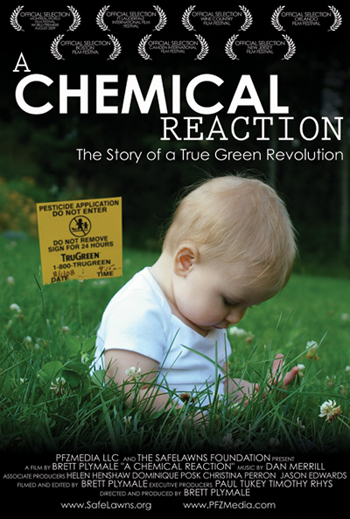| Pesticides banned throughout Canada due to growing concerns over health risks. |
| ABOUT US START IDEAS DO LESS USEFUL PLANTS PROJECTS VIEWS RESOURCES TOPICS |
|
|
|||
|
The 2009 documentary A Chemical Reaction centers around Canadian dermatologist June Irwin and her six-year campaign to convince the town government of Hudson, Quebec, that lawn chemicals create health issues in humans and should be banned for the public good. In 1991, Hudson became the first town in North America to ban lawn chemical use. After a lawsuit by pesticide industry representatives, the country's Supreme Court upheld the ban, and Quebec became the first Canadian province to enact a similar ban in 2003. By 2008, retail seller Home Depot had voluntarily removed synthetic lawn and garden pesticides from its stores throughout Canada, and more than 80 percent of the country had banned these products, due to the efforts of organizations including the Canadian Association of Physicians for the Environment (CAPE). CAPE's specific concerns are outlined in its Position Statement on Synthetic Pesticides, which includes special mention of the risks to children's health: "... there is growing evidence that the health of future generations may be severely harmed by pesticides, alone or in combination with other toxic chemicals now permeating the global ecosphere. The fetus and the newborn child, in particular, appear to be uniquely sensitive to the harmful effects of pesticides and other toxins." These pesticide bans didn't happen because there is overwhelming evidence that lawn and garden chemicals cause health problems in people as well as environmental problems, though the disturbing data continues to mount. The bans happened because Canadians embrace the precautionary principle regarding potential health and environmental threats. The precautionary principle is the idea that you don't need to have a proven danger in order to be cautious; rather, you need to have reasonable proof of the harmlessness of a substance before accepting its widespread use. If there is lingering doubt about the health risks of a particular substance, proponents of the precautionary principle would not use that substance. As one attorney explains in the movie, "Chemicals should not be innocent until proven guilty." The town of Hudson is known for its lovely gardens, including well-manicured and healthy lawns. These lawns have now been chemical-free for over two decades. Author and activist Paul Tukey, the impetus behind A Chemical Reaction, urges Americans to follow Canada's lead in being more cautious about using chemicals and finding less risky alternatives. "Most people in the US simply take these products for granted," he says. "They use them without a second thought." Tukey explains in detail how to maintain turfgrass without chemicals in his book The Organic Lawn Care Manual. The citizens of Hudson feel they've made a good decision in banning lawn chemical use. As one council member says in the movie, "If down the road science shows that we're wrong, then all that's happened is we have a few more dandelions. But if we're right, how many lives have we saved?" Their champion, Dr. Irwin, was honored for her contributions on May 6, 2011, when more than 80 North American organizations proclaimed a Lawn Pesticide Awareness Day. Her response: “Lawn pesticides are an example of people willfully, though maybe not knowingly, poisoning their neighbors. These are terribly toxic substances and yet, it seemed to me, there was a conspiracy of silence. I’m pleased that, to some degree, we have been able to break through that silence to get the word out.” Here is a partial list of research results showing negative effects of pesticides on the health of humans (particularly children), pets, and the environment:
|

See details and view a trailer for the movie A Chemical Reaction.  Read Paul Tukey's Organic Lawn Care Manual. 
Paul Tukey and Evelyn Hadden are founding members of the Lawn Reform Coalition, gardening and environmental advocates promoting change in the American lawn. Related info at LessLawn: Why We Need Bugs (a review of Doug Tallamy's book Bringing Nature Home) |
||
|
Thanks for visiting http://www.LessLawn.com! All site contents © 2001-2009 Evelyn J. Hadden, except where noted. All rights reserved. |